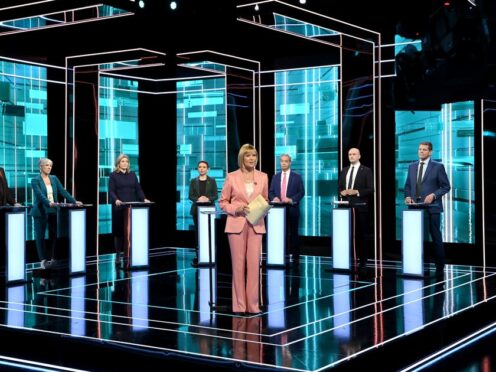Seven senior political party figures have met for a second TV clash – this time on ITV.
They first met for a multi-party debate aired on BBC One last week.
Julie Etchingham chaired this week’s showdown, with the Conservatives’ Penny Mordaunt, Labour deputy leader Angela Rayner, SNP Westminster leader Stephen Flynn, Liberal Democrat deputy leader Daisy Cooper, Plaid Cymru leader Rhun ap Iorwerth, Green Party co-leader Carla Denyer and Reform UK’s Nigel Farage behind each podium.
The seven senior figures took questions from the audience before they debated with each other – over the NHS, education, immigration and referenda.
Below, the PA news agency lists the key moments from Thursday night’s event.
– Leader of the opposition?
A landmark poll dropped just before ITV began broadcasting the seven-way debate.
Reform UK has outpolled the Conservatives with 19% – up two points. According to the YouGov poll for The Times, the Tories have stalled at 18% over the past few days while Labour is at 37%.
Introducing himself, Reform UK leader Nigel Farage said: “Just before we came on air we overtook the Conservatives in the national opinion polls. We are now the opposition to Labour.”
– A game of cat and mouse
Conservative Leader of the House of Commons Penny Mordaunt urged her rivals to keep “dogma” out of public services, such as the NHS.
“Most of the public don’t care what colour the cat is, they just want some mice caught,” she told her six rivals.

“They (the public) want results and in my experience, listening to people who are actually doing these jobs – police officers who have reduced crime by half over the time we’ve been in office, healthcare professionals who are coming up with amazing initiatives in our hospitals and in our GP surgeries, teachers who are responsible now have 90% of our schools good or outstanding. Listen to the professionals in those services, keep political dogma out of it.”
Plaid Cymru’s Rhun ap Iorwerth hit back: “I have to draw attention to the analogy with the cats and the mice here. What we’ve seen under the Conservatives and 14 years is the fat cats getting rich and getting the cream. I fear that with privatisation of the NHS, we’re going to see the same under Labour.”
– World class
ITV’s audience laughed when Penny Mordaunt described the UK’s education system as “world class”.
Conservative Ms Mordaunt said: “I think it is world class and we have improved.”
To laughter, she added: “Well, when we took office literacy rates were trailing the world, now they are leading them.
“We have 90% of our schools are good or outstanding and we have undertaken an enormous refurbishment programme.”
– Timid
Green Party co-leader Carla Denyer said: “I would like to know from Angela: why so timid? Why wait for economic growth when you could introduce a tax that doesn’t affect those on average incomes or lower incomes, it only affects the billionaires and multi-millionaires?”
Angela Rayner hit back: “I have never been called timid in my life.”
The pair were talking about Labour’s tax plans, unveiled in the party’s manifesto on Thursday. Ms Rayner pointed to reforms rather than tax and spend as the solution to the UK’s money woes and added: “We gutted our home care services, it costs so much more money now that people are stuck on trollies in A&E for 40-hours plus. These are our elderly relatives that are treated really poorly and it costs us more money, so if we put the money in the right place, we can actually make savings.”
– From cats to dog whistles
Taking a question about immigration, Rhun ap Iorwerth accused Nigel Farage of having been on “a dog-whistle tour of the UK for many, many years and exploiting the anxiety that people have”.

The Plaid leader said: “We need to heed and listen to people who have genuine concerns about the impact of the movement of population, pressures on public services, but we have to put that in the context of public spending cuts by the Conservatives.”
Angela Rayner had said: “What we need at the moment is a skills strategy. We have not had an industrial and skills strategy, so what we have is we’ve been over-reliant in our economy from overseas workers to fill our skills gap, and they’ve done a tremendous job in doing that and we have needed that, but what we really need is, as employment levels have gone higher again, is we need to really match those skills to give people opportunity to take those jobs.”
Nigel Farage replied: “Well, it’s funny Angela Rayner says that because Labour today launched their six key priorities at the General Election and didn’t mention the single most important issue affecting the lives of everybody in this country, namely the population explosion caused directly by migration.”
– Quick quiz
Julie Etchingham gave each politician the chance to ask one question of one opponent.
Penny Mordaunt of the incumbent Conservative Party took three questions but her challenger Angela Rayner took four.
– A Labour enabler?
“A vote for you is actually now a vote for Labour,” Nigel Farage told Penny Mordaunt, in reference to the YouGov poll which showed his party outpolling the Conservatives.
Ms Mordaunt accused Mr Farage of being “a Labour enabler”, a suggestion his party could split the Conservatives’ vote.
